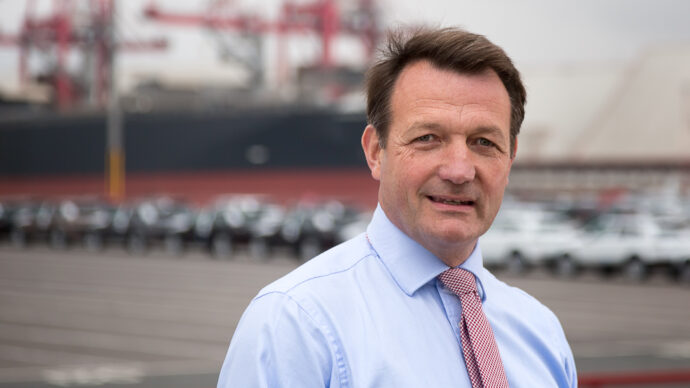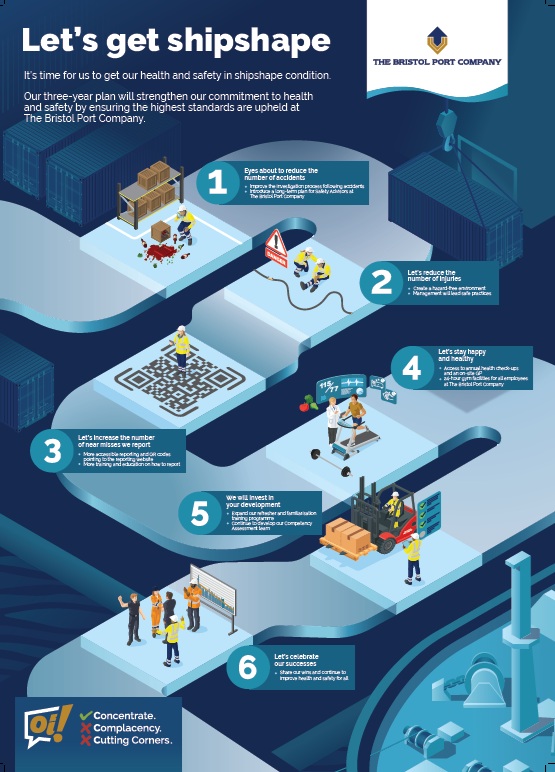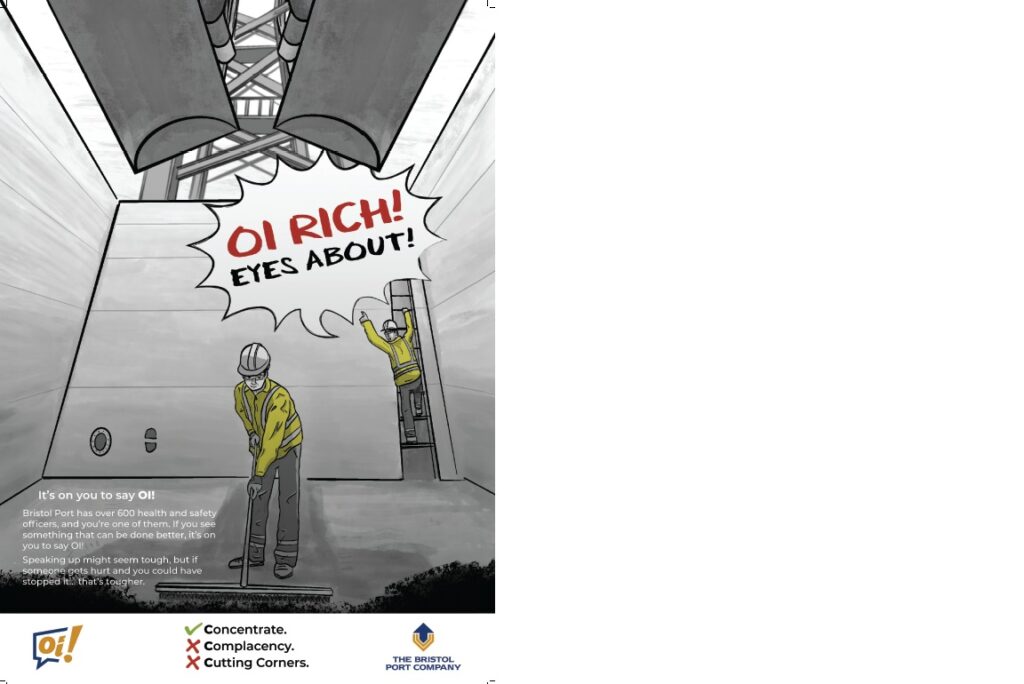NEWS
Safer Tomorrow thought leadership series: David Brown
Campaigns |Published: Aug 27, 2025

A Safer Tomorrow was a big part of the PSS members’ conference back in July, and more will be coming out shortly about the sector-wide view of where ports are on the road to a safer tomorrow. Continuing the series of thought leadership pieces, David Brown, Chief Executive of The Bristol Port Company (and previous chair of PSS) talks about the importance of data and measuring achievements in understanding where the focus needs to be.
David’s definition of a safe port echoes what most leaders in the sector feel, and are striving for: “A safe port is when everyone goes home without injury but more importantly, when they also feel they’ve contributed to a safer port the next day”.
He believes that the mantra of ‘zero harm’ may be a bit too one-dimensional as a measure of real change, and that the focus must be on a fundamental culture that promotes not only no physical harm, but also no mental harm. “A fundamentally safe culture is one which drives everyone to do something better the next day than you did today,” he adds.
One of David’s guiding principles is: “The standards you walk past are the standards you set.” This means visible leadership, every day. At The Bristol Port Company, every director carries out a monthly workplace inspection. This is not just to tick a box, but to show everyone that their leaders care and to reinforce the non-negotiables, like their “five points of PPE protection”.
“We’ve just written our three-year safety plan,” David explains. “Data will be at its core so we can measure ourselves against six key targets – ranging from increasing near miss reports to celebrating our successes. Each target is ‘owned’ by a different Director to ensure we strive for consistent and continual improvement”
“It’s the fundamental presence of the director out in the port, looking at operations through their own ‘safety goggles’ that reinforces what we’re trying to achieve.”
David acknowledges that whilst it is harder to do, culture must be measured and quantified, otherwise it’s just one person’s perception of culture. At Bristol they have used the HSE Safety Climate Tool since 2021, with 85% of staff taking part in their most recent survey. The feedback showed a strong overall safety culture score but also revealed frustrations when improvement actions weren’t fully followed through — an issue specifically targeted by their three-year safety plan.

In his role as Chair of PSS from 2019 to 2024, David was a keen advocate for a sector-wide safety climate tool and was instrumental in securing funding for academic research into its creation – something which the current health, safety, and culture strategy commits to taking forward.
“I’m a great believer in asking the workforce” David says. “We have two ears and one mouth and that’s the ratio that we should use in life. I think some organisations might be scared about going out and asking their workforce what life is really like in the workplace, but it really supports safety improvements, as well gaining the critical buy in and overall organisational culture.
“We’ve now completed [safety culture surveys] three times now, and our three-year plan will use the HSE Safety Climate Tool to make ensure that the ambers get turned to green and the reds get turned to amber over the next three years.”
The Bristol Port Company believes that collaboration through PSS also plays a big part in the improvements they have seen in the port. David urges all ports to be involved in the incident data collection dashboard as he believes ports can — and should — learn from each other, ‘not just to close performance gaps but to share what works when things go exceptionally well’. A recent audit at the port undertaken by PSS highlighted the need to celebrate success more deliberately and therefore, when an operation goes particularly smoothly and safely, they analyse why it went well and look for ways to replicate that model elsewhere in much the way they would for an incident or near-miss.
David also feels that, as a sector, ports still lag behind others with a willingness to share accident and data incidents. “PSS has an excellent portal to share this type of information – or free lessons – and this should be the norm (mirroring the airline industry) rather than exception.”
The ‘long game’ of culture
David is clear that culture change isn’t quick. He acknowledges too often there is a tendency for short-termism when looking to improve safety, and that is understandable because no one wants to see a repeat of an incident.
“When Sir Ranulph Fiennes was asked how he managed to climb Mount Everest, he answered: ‘you put one foot in front of the other, every day’. This is what is needed to change culture – it’s a constant journey that requires personal involvement at every level – from meeting every new starter on their first day to revamping inductions into a more interactive, test-based process.”
David also credits the impact of the PSS event he attended in 2024 where Formula 1 safety and technology expert Mark Gallagher spoke about ‘non-negotiable safety’.
“PPE is one of the obvious non-negotiables,” he says. “Anyone [coming onto our site] will see everyone wearing PPE – and that includes the directors, the commercial staff and any contractors.”

For The Bristol Port Company, the next step is eliminating hazards where possible by looking at ways to replace manual tasks with technology or automation. David explained that a recent AI-assisted CCTV system managed by PSS member RoboK, cut unsafe behaviours (not wearing the correct PPE, main machine interface breaches, etc) by 93% in just three months, and he credits its use as an educational tool rather than a punitive one, as the main driver.
Using the RoboK system as an example, David notes that technology can be the game changer for safety but that it must be introduced from the bottom up – involving supervisors and operators from the outset. AI and automation are valuable for analysing data, spotting risks, and removing people from hazardous tasks — but they must be blended with what he calls “the chemistry” of a skilled, engaged workforce. He also specifically praised the support he has had from his Unite the Union representatives who have fully embraced this technology as a tool to improve standards.
Investing in people for the future
David doesn’t think the port sector necessarily needs a whole new type of worker — but it does need to build resilience and broaden skills. Bristol’s apprenticeship programme combines technical training with resilience-building experiences like the Duke of Edinburgh Gold Award. Supervisors, who David believes have the toughest role in the port, receive tailored leadership and soft skills training to give them the confidence to challenge unsafe behaviour, whether that’s from a long-serving colleague or under operational pressure.
He believes the port has a stronger talent pipeline than ever before and encourages all ports to build close links with their local FE colleges and using the apprentice levy to the full. By working together, they can shape courses that equip local people with the skills needed for jobs at their local port.
Once again, quoting one of his hero’s David adds: “As Benjamin Franklin said, ‘An investment in knowledge pays the best interest’.”
